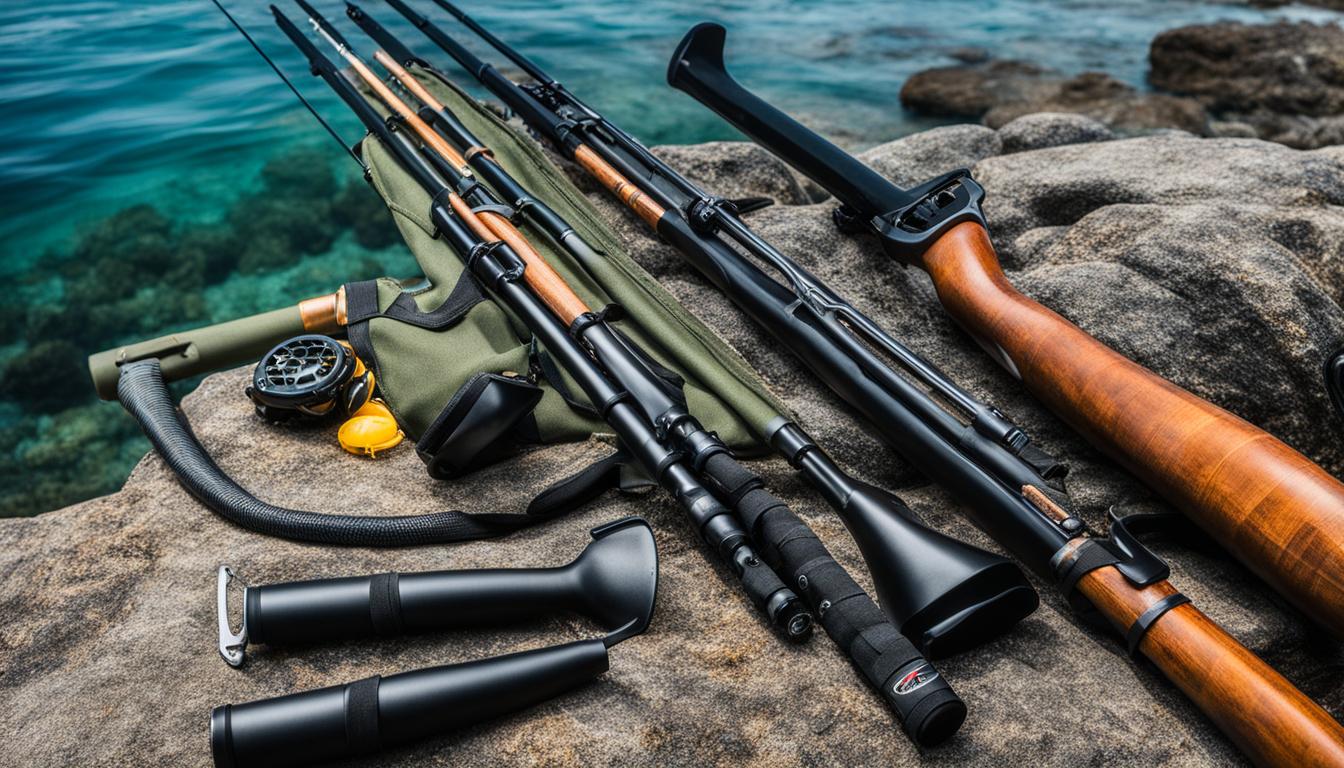Spearfishing Essentials: Gear, Tips & Destinations

Spearfishing, the art of underwater hunting, is a fascinating and eco-friendly method of fishing that has been practiced for centuries. It combines skill, technique, and a deep connection with nature, offering enthusiasts an exhilarating experience beneath the waves. Whether you’re a beginner or an experienced spear fisherman, having the right gear, knowledge of techniques, and a strong emphasis on safety is essential for a successful spearfishing adventure.
Underwater hunting requires specialized equipment designed to meet the unique challenges of the sport. From spearguns and pole spears to wetsuits and masks, each piece of gear plays a crucial role in your spearfishing experience. Learning the art of stalking fish, approaching them stealthily, and mastering diving techniques are also vital skills that can significantly improve your chances of a successful catch. Additionally, understanding the regulations and conservation ethics surrounding spearfishing destinations is crucial for responsible fishing.
Key Takeaways:
- Choose the right spearfishing gear, including spearguns, masks, snorkels, wetsuits, fins, and weight belts.
- Learn spearfishing techniques such as stalking fish, approaching without spooking them, and diving effectively.
- Research and understand the local regulations and laws regarding spearfishing in different destinations.
- Join spearfishing clubs and communities to network with experienced divers and enhance your skills.
- Prioritize safety by receiving proper training, utilizing the buddy system, and being aware of potential risks.
Essential Spearfishing Gear
When it comes to spearfishing, having the right gear is essential for a successful and enjoyable underwater hunting experience. Here are the key items of spearfishing gear every enthusiast should consider:
Primary Weapons
- Hawaiian slings
- Pole spears
- Spearguns
These tools are the primary means of capturing fish underwater. Hawaiian slings provide accuracy and ease of use, while pole spears offer versatility and longer reach. Spearguns, on the other hand, provide power and precision. Choose the weapon that suits your style and skill level.
Protective Gear
- Wetsuits or rash guards
- Masks and snorkels
- Gloves and booties
Wetsuits or rash guards not only protect you from the elements but also provide camouflage to blend in with the surroundings. Masks and snorkels are crucial for maintaining visibility, allowing you to spot your prey. Gloves and booties provide warmth, grip, and protection against sharp objects.
Propulsion and Safety
- Fins
- Weight belts
- Knives
Fins help you move efficiently and silently through the water, providing the necessary propulsion for hunting. Weight belts assist in buoyancy control, allowing you to dive and ascend with ease. Knives are important safety tools that can be used for cutting lines, freeing yourself from entanglements, or dispatching your catch.
Tracking and Timekeeping
- Freediving watches
Freediving watches are designed to track your dive depth, duration, and surface intervals. They provide valuable data to monitor and improve your diving performance.

Joining Spearfishing Clubs and Communities
Joining spearfishing clubs and communities is a great way to enhance your spearfishing experience. These groups provide a wealth of knowledge, resources, and opportunities to network with fellow spearos. By connecting with experienced divers, you can learn valuable techniques and tricks of the trade. Spearfishing clubs often organize events, competitions, and training sessions, fostering a sense of camaraderie among enthusiasts.
Networking with experienced divers in spearfishing clubs and communities can significantly improve your skills and understanding of the sport. By sharing experiences and learning from others’ expertise, you can gain new insights and enhance your spearfishing abilities. Connecting with like-minded individuals who share your passion for spearfishing creates a supportive community that can inspire and motivate you to explore new depths.
If you’re looking to become an even better spearfisher, joining local spearfishing clubs or online communities is highly recommended. These platforms offer an excellent opportunity to connect with experienced divers, exchange tips, and share stories. By actively engaging in spearfishing communities, you can accelerate your learning and make lasting connections within the spearfishing world.
Spearfishing Conservation and Ethics
Spearfishing conservation and ethics are essential to ensure the long-term sustainability of this ancient fishing method. By practicing sustainable fishing practices and respecting marine habitats, spearfishers can contribute to the preservation of our precious marine ecosystems.
One crucial aspect of spearfishing conservation is obeying catch limits. It is important to stay informed about local regulations and restrictions on the number and size of fish that can be caught. This ensures that fish populations have the opportunity to replenish and thrive.
Responsible spearfishers also prioritize the release of undersized fish. By allowing these smaller fish to grow and reproduce, we contribute to the natural balance of marine ecosystems. This practice helps to maintain healthy fish populations and ensures the sustainability of the sport.
Avoiding endangered species is another ethical aspect of spearfishing. Endangered species are vulnerable and need our protection to recover their numbers. Spearfishers should research and be knowledgeable about which species are endangered in their area. By avoiding the targeting of these species, we play a crucial role in their conservation.
Respecting marine habitats is of utmost importance. Spearfishers should take care to avoid damaging coral reefs, seagrass beds, and other sensitive habitats. By being mindful of our impact on these ecosystems, we can minimize any destructive consequences and preserve their beauty and biodiversity for future generations.
It is our responsibility as spearfishers to promote responsible fishing practices and educate others about the importance of conservation. By setting a good example, we can inspire others to adopt sustainable fishing practices and protect the marine environment.
Remember, spearfishing can be a thrilling and rewarding activity, but it is our duty to ensure that our actions have a minimal impact on the underwater world. Together, through sustainable practices and a commitment to conservation, we can enjoy spearfishing while safeguarding the oceans for generations to come.
Spearfishing as a Sport and Recreational Activity
Spearfishing is not only a thrilling sport but also a rewarding recreational activity. It combines the excitement of hunting underwater with the connection to nature, making it a favorite pastime for many enthusiasts.
In the realm of competitive spearfishing, skilled spearos showcase their expertise and sportsmanship in tournaments and competitions. It is a chance to test their abilities against fellow spearfishers, pushing the boundaries of their skills, and aiming for victory. Competitive spearfishing requires precision, strategy, and a deep understanding of the marine environment.
On the other hand, recreational spearfishing offers the opportunity to enjoy the sport at a more relaxed pace. It allows individuals to savor the thrill of the hunt, immersing themselves in the underwater world and observing marine life in their natural habitat. Recreational spearfishers can tailor their experience to their preferences, from exploring new locations to targeting specific species, creating unforgettable memories along the way.
Whether engaging in competitive spearfishing or pursuing it recreationally, the sport offers a unique connection to nature and the ocean. It promotes a sense of respect and appreciation for marine ecosystems, as spearfishers witness firsthand the beauty and diversity of underwater life.
The image above captures the intensity and skill required in competitive spearfishing. It showcases the dedication and focus of spearos as they compete for success in the sport.
Conclusion
Spearfishing combines the thrill of underwater hunting with the principles of sustainability and eco-consciousness. To fully enjoy this exciting sport while preserving marine ecosystems, it is important to prioritize safety, understanding local regulations, and investing in the right gear and techniques.
By researching and selecting the appropriate spearfishing gear, such as Hawaiian slings, pole spears, or spearguns, along with wetsuits, masks, snorkels, gloves, booties, fins, weight belts, knives, and freediving watches, spearos can enhance their chances of success and safety while exploring underwater realms.
Mastering spearfishing techniques, including stalking fish, approaching them without alarming them, and diving effectively, is crucial for a rewarding experience. Spearfishing clubs and communities provide valuable insights and networking opportunities to learn from experienced divers, improving skills and fostering a sense of camaraderie.
While spearfishing destinations offer breathtaking coastal areas with clear waters, it is essential to abide by local regulations, be mindful of travel safety, and promote responsible fishing practices. By embracing spearfishing as an eco-friendly sport and recreational activity, enthusiasts can relish in the benefits of acquiring fresh, nutritious seafood, engaging in outdoor adventures, and deepening their connection with nature.
FAQ
What gear do I need for spearfishing?
Essential gear for spearfishing includes Hawaiian slings, pole spears, or spearguns as primary weapons; wetsuits or rash guards for protection and camouflage; masks and snorkels for visibility; gloves and booties for warmth and protection; fins for propulsion; weight belts for buoyancy control; knives for safety; and freediving watches for tracking dive data.
How do I choose the right spearfishing gear?
When choosing spearfishing gear, consider factors such as visibility, target species, water temperature, and personal preferences. Popular brands for spearfishing gear include JBL, Cressi, Beuchat, Rob Allen, Salvimar, Omer, Riffe, Mako, and Hecs.
What techniques and tips are important for spearfishing?
Important spearfishing techniques include learning fish habits, how to stalk and approach them without spooking, and effective diving techniques. Joining spearfishing clubs and learning from experienced divers can improve your skills and knowledge.
What are popular spearfishing destinations?
Popular spearfishing destinations include warm coastal areas with clear waters. However, it’s important to research and understand local regulations and laws regarding spearfishing.
How should I travel with my spearfishing equipment?
When traveling with spearfishing equipment, check your airline’s policy regarding sporting equipment. Properly pack, separate your dive gear, label your baggage, and arrive early at the airport to ensure a smooth travel experience. Shipping your gear to your destination can be an alternative option.
What are important safety precautions for spearfishing?
Proper training in spearfishing techniques, diving, and safety protocols is crucial. Always use the buddy system when diving and be aware of potential risks, such as shallow water blackout. Joining spearfishing clubs or seeking professional training can provide valuable knowledge and ensure a safe experience.
What are the benefits of spearfishing?
Spearfishing is an eco-friendly fishing method that provides fresh and nutritious seafood. It also offers a fun outdoor activity and allows individuals to connect with nature and appreciate the underwater world.
How can I join spearfishing clubs and communities?
Joining spearfishing clubs and communities provides access to valuable knowledge and resources. Networking with experienced divers and learning from their expertise can greatly enhance your spearfishing skills.
How can I practice spearfishing conservation and ethics?
Spearfishing conservation and ethics involve practicing sustainable fishing practices, respecting marine habitats, obeying catch limits, releasing undersized fish, and avoiding targeting endangered species.
Is spearfishing considered a sport or recreational activity?
Spearfishing can be both a sport and a recreational activity. Competitive spearfishing involves participating in tournaments and competitions, showcasing skills and sportsmanship. Recreational spearfishing allows individuals to enjoy the sport at their own pace, focusing on the thrill of the hunt and the connection with nature.




